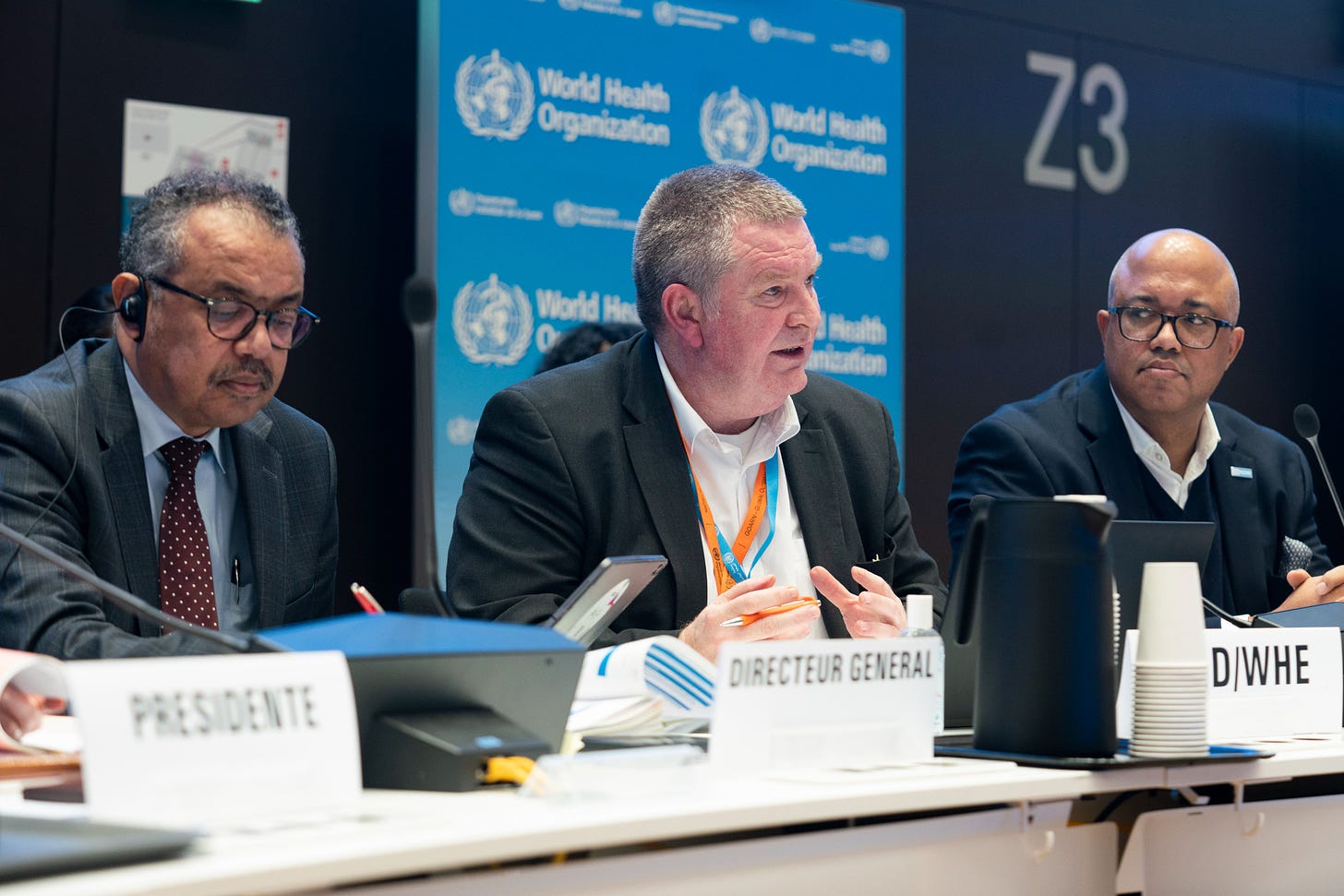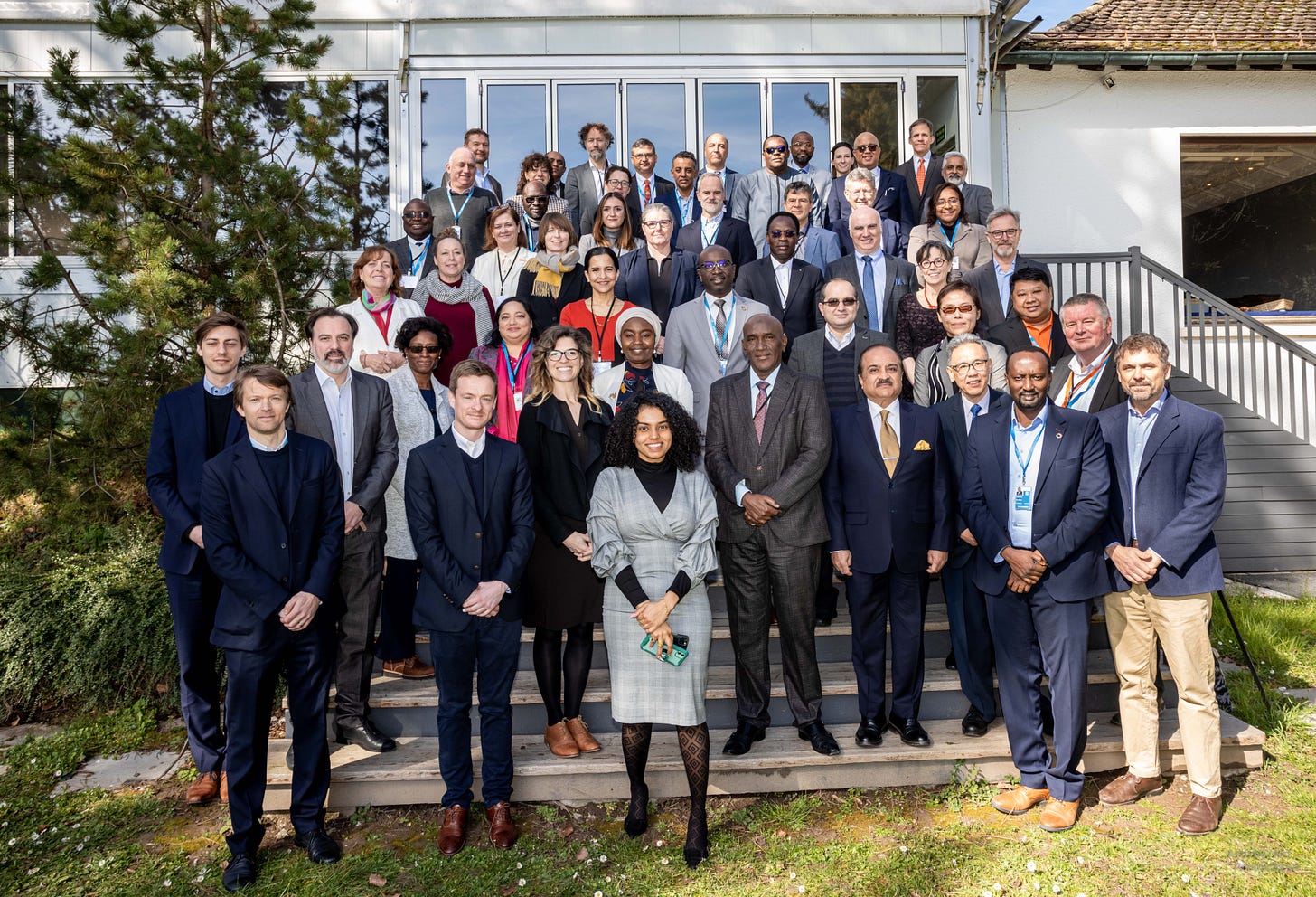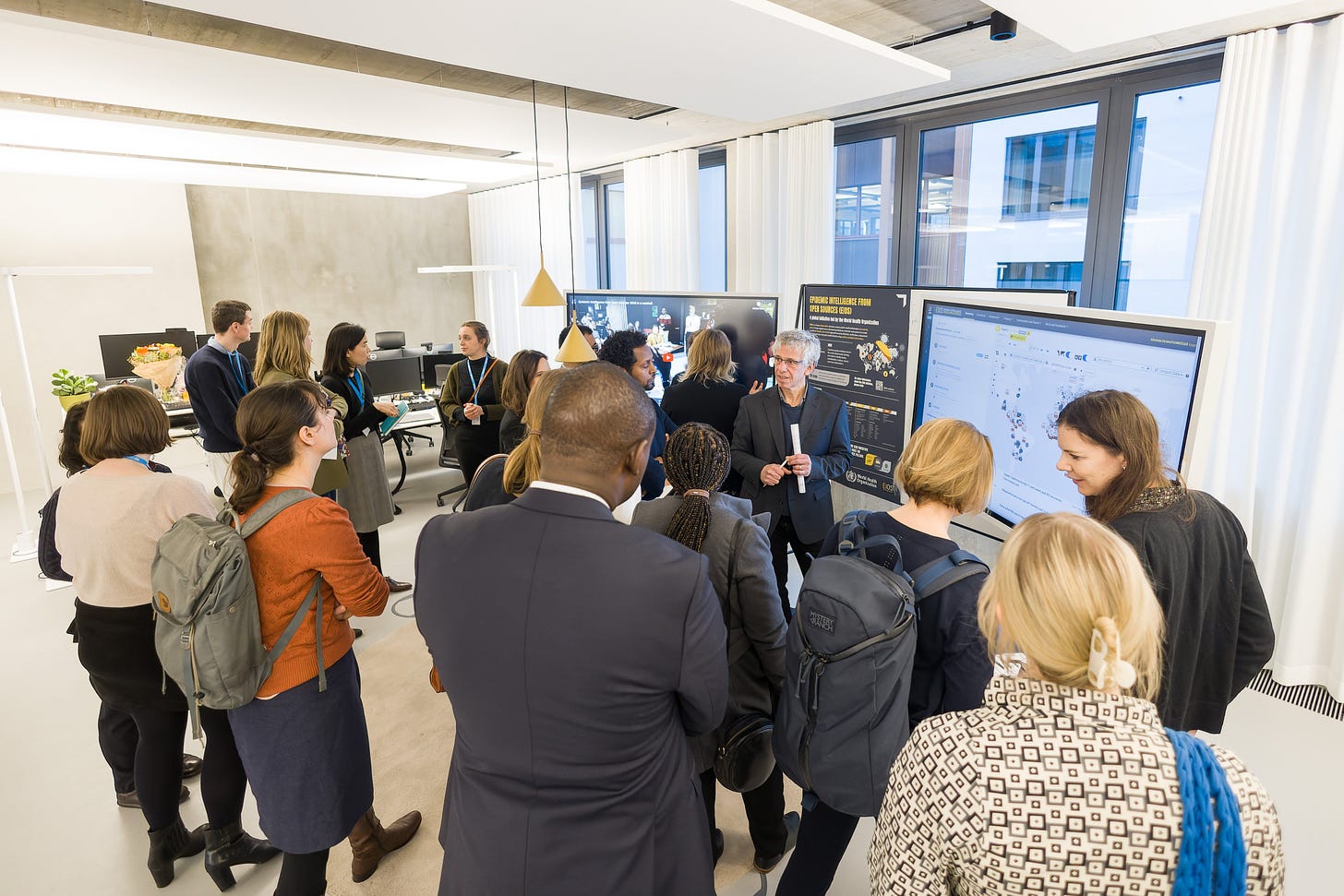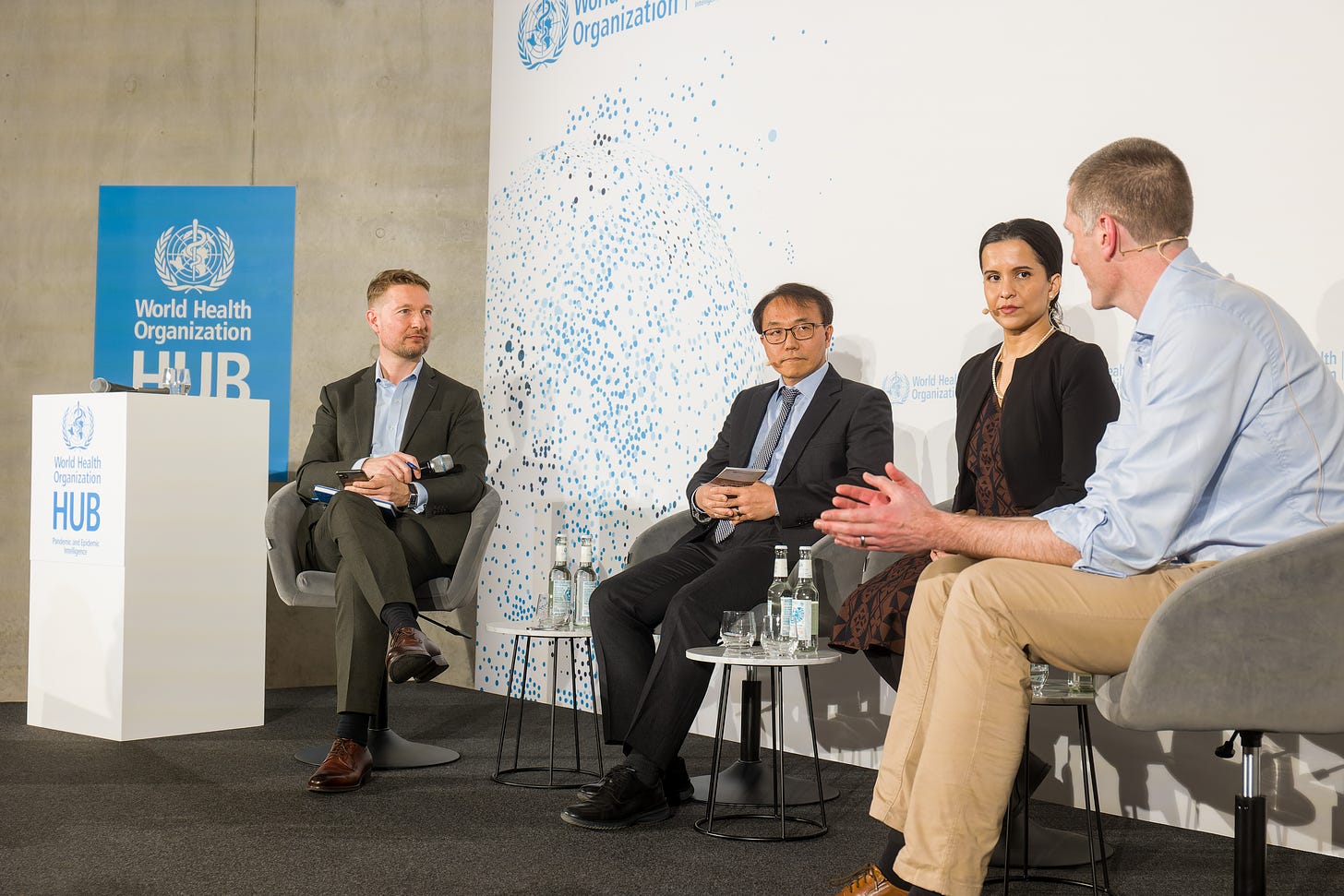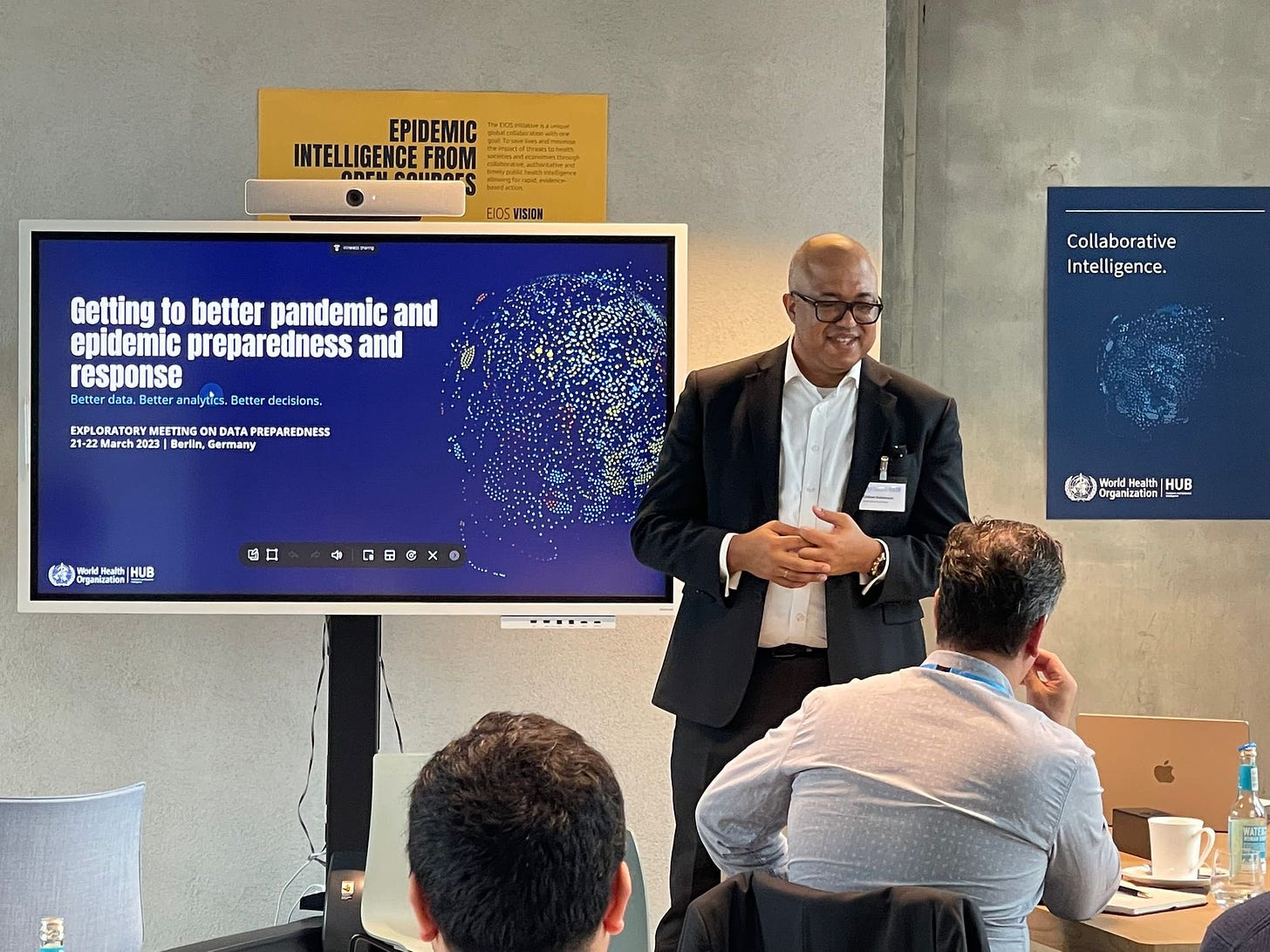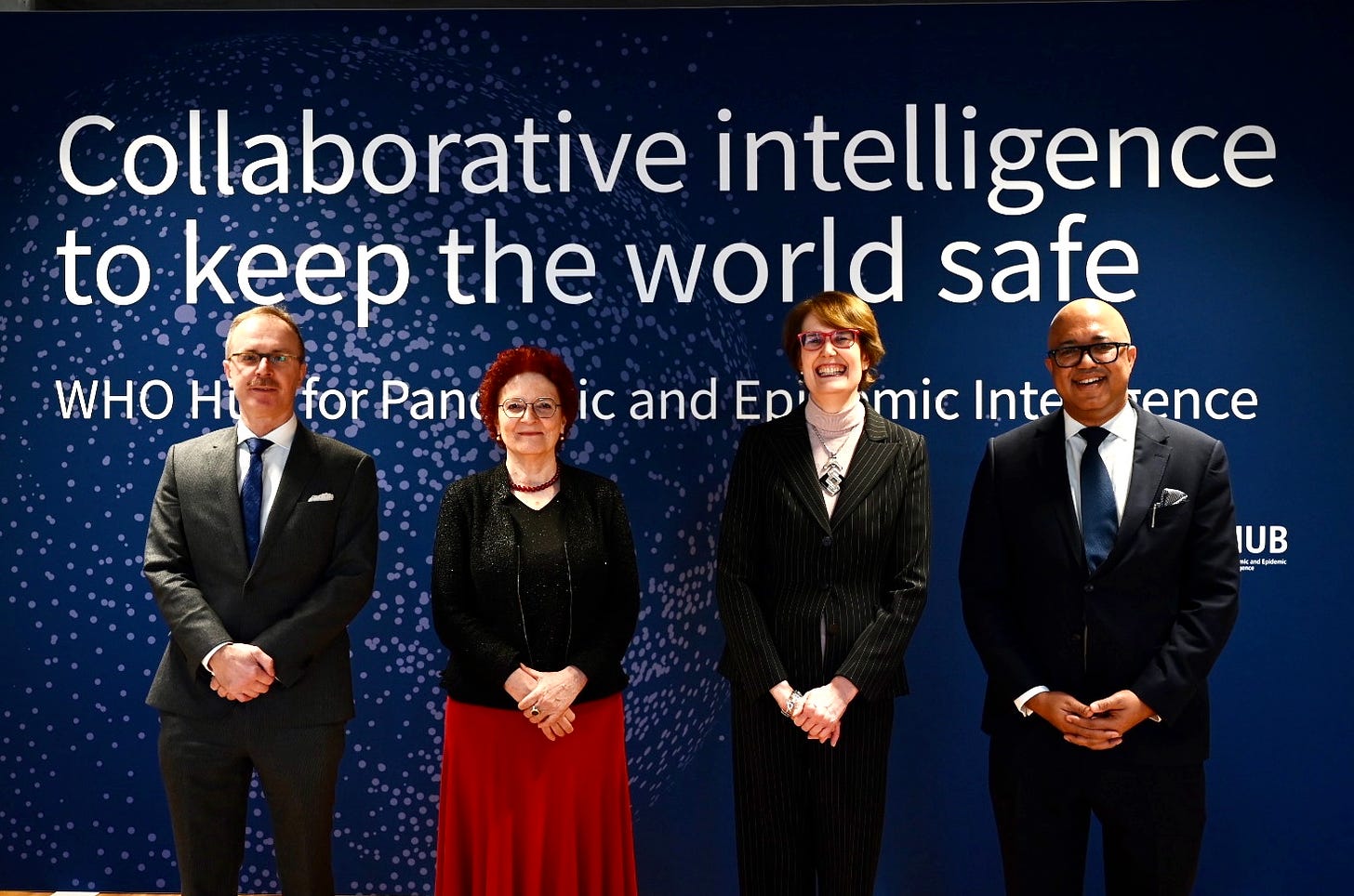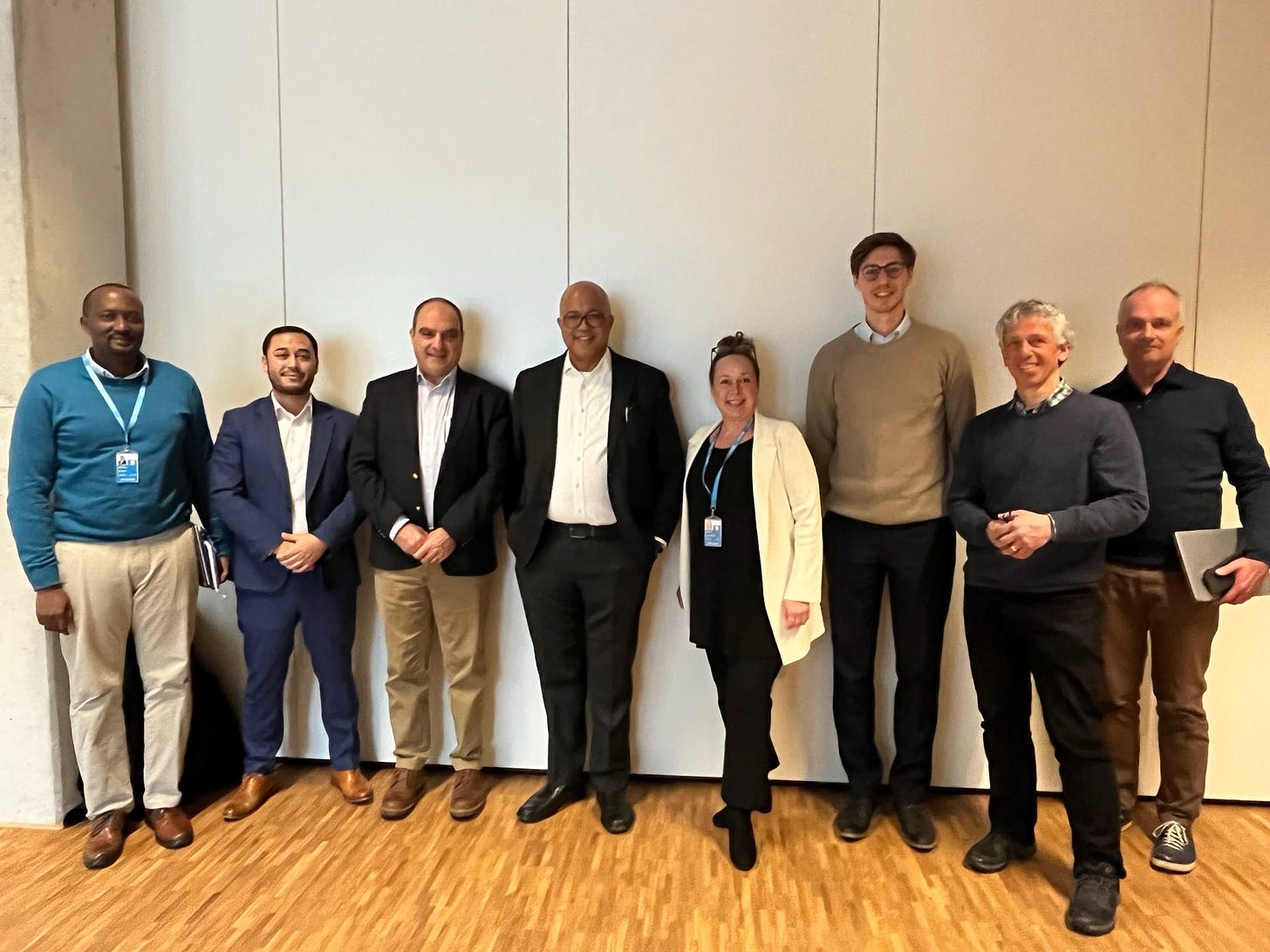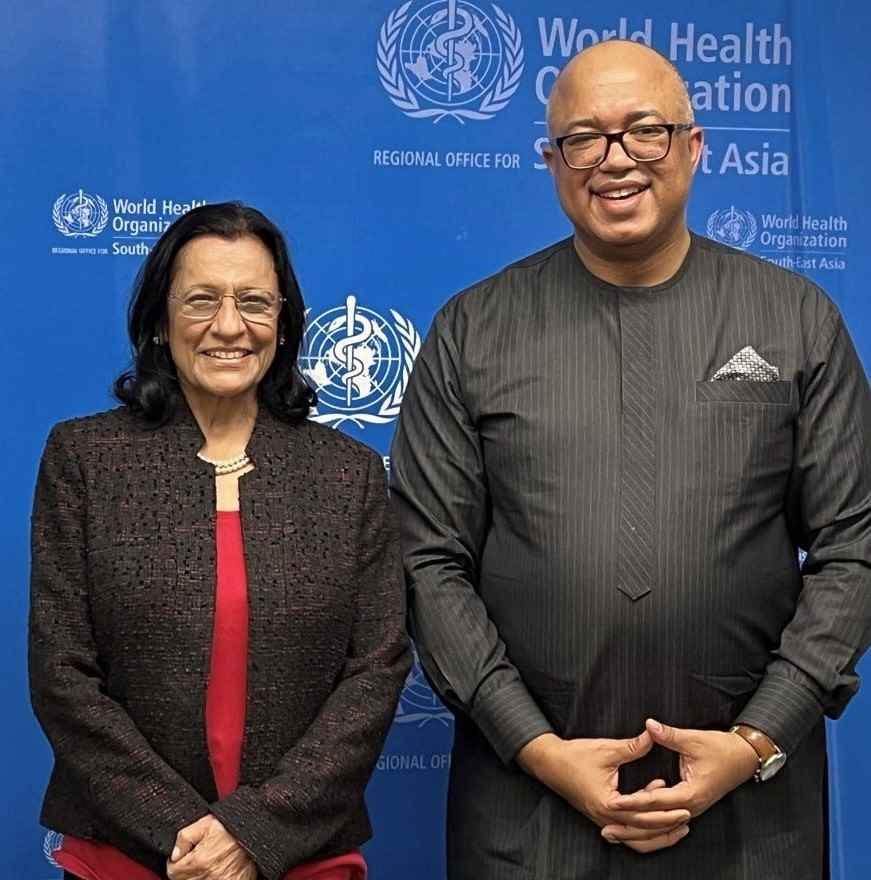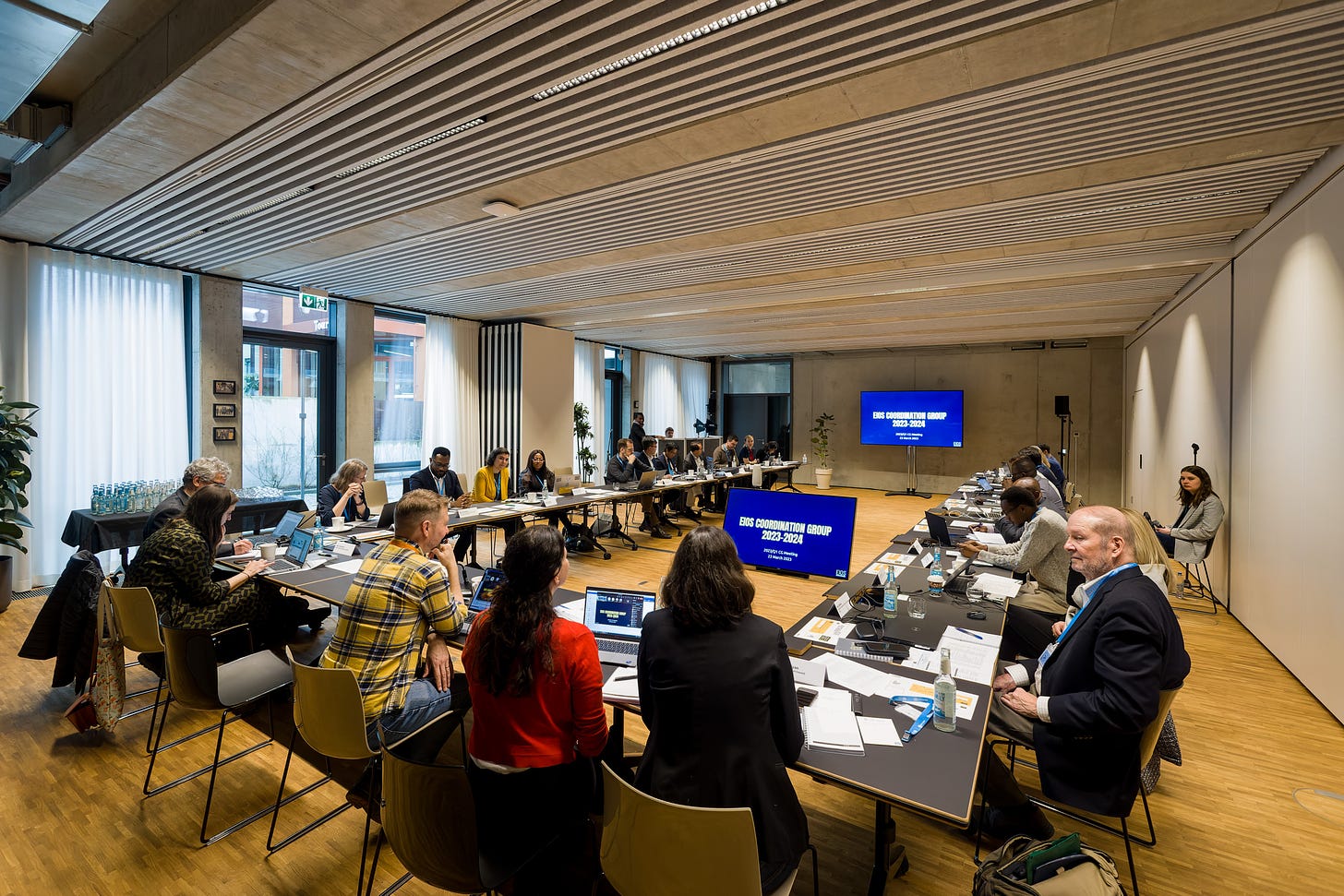The WHO Hub for Pandemic and Epidemic Intelligence had a productive first quarter of 2023, marked by several significant events. These include the 152nd session of the WHO Executive Board; hosting the National Public Health Agencies (NPHAs) Workshop on behalf of the WHO Health Emergencies Programme; the fourth session of the WHO Pandemic Hub’s Speaker Series; and the Hub’s first “Open House,” among other activities. Additionally, the Hub hosted several high-profile visitors including the European Commission Director General of the Directorate-General for Health and Food Safety (DG SANTE), the Director of the European Centre for Disease Prevention and Control, the State Secretary for the Federal Ministry of Health, Germany and the Deputy Director of the World Food Programme’s Global Office in Germany.
Read on for more on these and other recent developments!
WHO Executive Board Meeting
During the 152nd session of the WHO Executive Board held from 30 January – 7 February, Dr Chikwe Ihekweazu, Assistant Director-General and head of the WHO Pandemic Hub, joined a session with Dr Tedros Adhanom Ghebreyesus, WHO Director-General and Dr Michael Ryan, Executive Director, WHO Health Emergencies Programme. Together, they presented Member States with the details of the Director-General’s framework to strengthen the Global Architecture for Health Emergency Preparedness, Response and Resilience. The framework emphasises the importance of aligning preparedness and response activities based on robust national level capabilities and continued collaboration with Member States and partners to strengthen global health security.
Dr Ihekweazu had the opportunity to meet with several global and national leaders and partners during the event.
©WHO/Christopher Black
National Public Health Agencies (NPHAs) Workshop
Held on 14-15 March in Geneva, Switzerland, this event brought together leaders from selected Member States' NPHAs, regional entities, as well as global partners and networks involved in Health Emergency Preparedness and Response. The workshop focused on the role of NPHAs in delivering essential preparedness and response capabilities for public health emergencies. Over the course of two days, attendees discussed different NPHA experiences, highlighting best practices in collaborative surveillance, community protection, safe and scalable clinical care, access to countermeasures, emergency coordination, financing for preparedness and response, and strengthening the public health workforce. The NPHA workshop was an excellent opportunity to exchange ideas and experiences across NPHAs and partners, and to strengthen partnerships across the global public health community.
©Andre Art Studio
Open House at the WHO Pandemic Hub & Speaker Series
On March 21, we hosted our first public event at the WHO Pandemic Hub office building in Berlin, Germany. Over 100 guests from our international and Berlin-based community attended the “Open House” to explore our space, meet the team and gain insights into our work and collaborative projects with our partners. On the same day, we hosted the fourth session of our quarterly, hybrid speaker series titled ‘Complexity of Pandemics N°4 - Working towards Data Preparedness.’
Our moderator Sara Hersey, Director for Collaborative Intelligence at the WHO Pandemic Hub, led us through an inspiring discussion on the concept of “Data Preparedness”: how do national public health agencies develop their infrastructure, work force, technologies, and networks to attain high-quality data for pandemic and epidemic intelligence? Our esteemed speakers included Prof Steven Riley, Director-General for Data, Analytics and Surveillance at the UK Health Security Agency, Dr Aalisha Sahukhan, Head of Health Protection at the Fiji Ministry of Health and Medical Services and Dr Sangwoo Tak, Director for Risk Assessment at the Korea Disease Control and Prevention Agency. Each shared their unique perspective on what being “data prepared” means in their respective country’s context.
During the panel discussion, Dr Oliver Morgan, Director, Health Emergency Information and Risk Assessment, for WHO’s Health Emergencies Programme, moderated a discussion on the role of multilateral collaborations, the potential of multifunctional surveillance systems providing ongoing value for national-level health protection, and the challenge of finding balance between investing in people and technologies for data preparedness.
We are grateful for the support and participation of our community from across the world.
Watch the event recording here!
©Thomas Rafalzyk
Save the date! The next session of our hybrid Speaker Series is scheduled for 13 June (exact time to be confirmed), at the WHO Pandemic Hub. Stay tuned for more information on how to register.
Data Preparedness Workshop
In addition to our Speaker Series event, the WHO Pandemic Hub held a two-day workshop on Data Preparedness on 21 and 22 March, which brought together 20 thought-leaders from national public health agencies, foundations and academic institutions from Member States including Canada, Fiji, Germany, Korea, Netherlands, Singapore, UK, USA and Zambia. The discussions were highly productive, and we look forward to implementing the insights and ideas generated during this workshop into our ongoing efforts to strengthen pandemic and epidemic intelligence.
©Thomas Rafalzyk
Pandemic and Epidemic Intelligence Innovation Forum
The WHO Pandemic Hub hosted the first session of the Pandemic and Epidemic Intelligence Innovation Forum on 9 March. During the session, two journalists, Rukmini S and Christian Endt, shared their data journalism work during the COVID-19 pandemic in India and Germany respectively. Over 58 colleagues from 19 institutions participated in the forum and discussed the vital role of data journalism during recent outbreaks. They also explored was to build stronger, trusted partnerships between public health institutions and data journalists to improve the visibility and utility of public health surveillance and intelligence data.
New WHO Open Source Strategy
The Open Source Programme Office (OSPO) has kicked off the development of a new, comprehensive WHO Open Source Strategy that will provide guidance for the development of sustainable, open source technological solutions. This strategy will be a valuable resource for development teams to build digital public goods that are readily available for use by Member States without any licensing fees. Additionally, it will facilitate open innovation and collaboration with various organizations, academia and public health institutions. A review of the WHO-wide strategy has begun, with contribution from WHO’s Office of the Legal Counsel (LEG), the Science Division (SCI), the Digital Health and Innovation (DHI) team and Information Management and Technology (IMT), and in consultation with country and regional representatives.
Visits to the WHO Pandemic Hub:
High level visit from DG SANTE; ECDC; and Federal Ministry of Health, Germany
On 28 February, the WHO Pandemic Hub hosted the European Commission Director General of the Directorate-General for Health and Food Safety (DG SANTE), Sandra Gallina, and representatives; as well as Director Andrea Ammon and representatives of the European Center for Disease Prevention and Control (ECDC). The meeting also included Thomas Steffen, State Secretary for the German Federal Ministry of Health as well as Oxana Domenti, WHO Representative to the European Union (EU), and Richard Peabody representing the WHO Regional office for Europe. During the visit, they discussed the EU Global Health Strategy, EU Cross-Border Health Threats Regulation, ECDC/SANTE Surveillance Strategy, and the respective global health security efforts and priorities of the WHO Pandemic Hub and WHO Regional Office for Europe. The President and representatives of the World Health Summit also joined parts of the meeting to align with the European Commission and WHO partners on the role the Summit plays in supporting pandemic preparedness.
The Director General of DG SANTE, Sandra Gallina, highlighted the importance of the EC’s partnership with the WHO Pandemic Hub given its global collaborations and mission, emphasizing the critical role of preparedness in Member State agendas. Dr Ihekweazu highlighted the importance of collaboration in many areas, including the implementation of the Serious Cross-Border Threats to Health Regulation, to ensure the added value of respective efforts.
The meeting ended with an agreement to strengthen partnerships in priority areas. The ECDC and the WHO Pandemic Hub identified actionable next steps to advance collaboration in specific areas of mutual interest.
©Christian Kruppa
Visit of the Deputy Director of the World Food Programme’s (WFP) global office in Germany
On 10 February, Dr Ihekweazu welcomed Sigrid Müller, Deputy Director of WFP’s global office in Germany to the Hub. Expanding the UN family in Germany means new opportunities for collaboration and closer synergy on our priorities, working together to support Member States.
Visit of the UN Operations and Crisis Centre (UNOCC)
On 14 February, the WHO Pandemic Hub hosted a delegation from UNOCC including George Khoury, Director and Luzal Vaidya, Chief Data Scientist. The visit provided an excellent opportunity for both organisations to exchange ideas and learn more about each other’s work. UNOCC shared its experience in the areas of Situational Awareness and Integrated Analysis and in distilling complex information from a multitude of sources for an audience of high-level decision makers, which has relevance to the work of the WHO Pandemic Hub. The WHO Pandemic Hub presented its EIOS application and underlying technology, which may be useful for UNOCC's needs. Both organisations expressed interest in exploring potential collaboration opportunities to leverage each others’ strengths and expertise in data analytics and information management.
© WHO/Heraa Hajelsafi
Visit to the WHO South-East Asia Regional Office
On 9-10 March, Dr Ihekweazu visited WHO’s South-East Asia Regional Office in New Delhi, India, where he was hosted by Regional Director, Dr Khetrapal Singh. This is part of a series of regional and country-level visits to learn more about ongoing and planned work related to the Division. Dr Ihekweazu shared the vision, current status and emerging priorities for the WHO Pandemic Hub and the Division of Health Emergency Intelligence and Surveillance. He also learned more about the region’s work and country perspectives, with particular emphasis on epidemic intelligence and surveillance.
© WHO/Heraa Hajelsafi
Visit to India’s Ministry of Health
While in New Delhi, visiting WHO’s SEARO and India Country Offices, Dr Ihekweazu had the opportunity to meet with Rajesh Bhushan, Secretary of the India Ministry of Health & Family Welfare. They discussed the G20 India Presidency, the country’s strategic directive towards developing digital public health products and programmes for streamlining the integration of data sources to drive actionable insights and support decision making. In addition, Dr Ihekweazu visited the Health Emergency Operations Center at the Ministry and met with teams from the India Digital Health Observatory and the India National Centre for Disease Control. These visits provided a valuable opportunity for knowledge exchange and collaboration between the WHO Pandemic Hub and India's public health officials.
EIOS Updates
A few months have already passed since members of the global public health intelligence (PHI) community gathered in Luxor, Egypt, for the EIOS initiative’s key annual event: the EIOS Global Technical Meeting (GTM). The video from this memorable event, which explored complexities and the renewed emphasis on trust in the changing PHI landscape, is now live on the EIOS website. Hear from participants how they experienced the event and collaborative spirit of the meeting, and check out presentations, selected sessions’ recordings, speakers’ bios, and photos from the 2022 EIOS GTM.
Welcome EIOS Coordination Group 2023-2024!
As a global collaborative initiative, the EIOS is governed by a 12-member Coordination Group (CG) with representatives from various organisations and Member States who rotate bi-annually. This year’s CG includes delegates from the European Commission, the Nigeria Centre for Disease Control, the Robert Koch Institute, as well as the Ministries of Health in Brazil, Iraq, and Singapore. The remaining representatives from the Africa Centres for Disease Control and Prevention, the US Centers for Disease Control and Prevention, the Food and Agricultural Organization of the United Nations, the European Centre for Disease Prevention and Control, the World Organisation for Animal Health, and the World Health Organization will continue their mandates for a second term.
©Thomas Rafalzyk
Join us in welcoming the new EIOS CG 2023-24!
To read more about the EIOS initiative please visit the EIOS website at https://www.who.int/initiatives/eios
EIOS system trainings and webinar
Between December 2022 and March 2023, a total of 8 Member States from 5 WHO Regions and 1 Organization joined the EIOS initiative and completed the 3-day EIOS system training. We are delighted to welcome onboard Angola, Bangladesh, Cuba, Georgia, Guyana, the Kingdom of Saudi Arabia, Thailand, Ukraine, and the Gulf CDC.
In February, EIOS also held its latest webinar “EIOS communities: The Singapore MoH and Lebanon MoH” where 250 participants from nearly 62 countries attended.
The next webinar is scheduled for April 2023. Stay tuned!
EIOS self-paced online course now available in French
Since February 2022, the online self-learning course “Introduction to Epidemic Intelligence from Open Sources” has been available in English to EIOS account holders within the EIOS system portal. In September 2022, the course was also made available in Portuguese.
As part of our commitment to make this course more accessible, the EIOS introduction course is now available in French! Interested in having a sneak peak? You can find the first module here in English, French, and Portuguese. This course can be followed at the participant’s pace and is an opportunity to complement the workshops. Nearly 850 professionals have already enrolled in the course.
Thanks for subscribing to Pandemic and epidemic intelligence. Feel free to share this newsletter. Visit our website here.



